The Women in Law Awards is right around the corner, and Lawyers Weekly is beyond thrilled to celebrate the many women in the profession who are making a big difference for their workplaces and their clients. Protégé talks with the law student finalists to discuss how they have already made an impact so early in their careers.

In the tenth annual Women in Law Awards, 10 new lawyers are nominated in the category of law student of the year. All 10 of these budding lawyers have made an incredible contribution to the legal profession already, and each has an exciting career ahead of them filled with a passion for promoting more women in law.
Finalists Hannah Williams, Olivia Morris, Rachel Stanton and Janelle Chaptini will provide their responses at a later date.
Charlotte Bull, Proximity
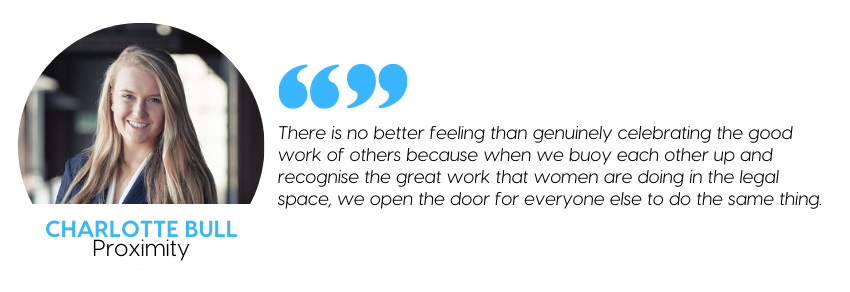
What does it mean to you to be a finalist in this years’ Women in Law Awards?
A: It’s a real honour to be selected as a finalist in this years’ Women in Law Awards. It was truly a pleasant surprise when I heard I’d made it to the final 10 when there are just so many talented young women out there studying law! To be recognised in this way is really the “cherry on top” of a fantastic year receiving my bachelor of laws (honours) degree, completing GDLP, and being admitted to the ACT Supreme Court.
What are some of the areas of law that you’re most passionate about?
A: I have had the good luck to work in many areas of law in the first few years of my career and to study an even broader range at university. They have all been interesting, but I have always found myself gravitating back towards climate law and its intersection with other international and domestic legal disciplines.
I am passionate about the potential of offshore renewable energy and the role which I feel sure it will play in securing our global future, reducing emissions, and providing green energy to Australian homes and businesses. I am fascinated by the law of the sea and its intersection with energy generation and climate-necessitated conservation efforts. But also on the more micro-scale, I am interested in the way that climate-related laws and lawmaking affect parts of our population differently and investigating ways in which any negative impacts of climate law can be mitigated – certainly a hot topic at present!
What are some of your goals for your legal career?
A: In the short term, my goal is to appear in court for the first time without messing up!!! But in the long term, and for fear of sounding cliched, I really aspire to have a career where I can make a difference. The beauty of the law, and being a lawyer, is that that difference could manifest itself in so many ways, and each of them is completely valid.
Whether it is that I represent individuals in court, or if I work for a multi-national corporation to ensure it’s in compliance with international climate law, or if I end up working on something else entirely, my goal is to always work to the best of my ability work in a space which I am passionate about. Perhaps one day, as all law students dream about, in the United Nations.
How important do you think it is that new female lawyers are recognised?
A: I think it’s extremely important to see your peers recognised for their achievements and good work! There is no better feeling than genuinely celebrating the good work of others because when we buoy each other up and recognise the great work that women are doing in the legal space, we open the door for everyone else to do the same thing.
I think that new female lawyers can have a propensity to downplay the achievement of finishing our degrees; instead of celebrating what we have done, we tend to focus on the next milestone to chase. Yes, there are many more things for us all to go out and achieve after this year, and yes, other people have already achieved the things that we are being recognised for, but each of us had to really put in the work to get this far, and I think that it is important to stop and acknowledge that.
In doing so, we are showing others that it is a good, and healthy, thing to pause for a little while and to acknowledge the achievements of people at all stages of their career, emboldening them to implement that recognition in their own professional and personal practice.
Have you got any female role models, and do you hope to one day be one?
A: I have been surrounded by strong female role models all throughout my life, and I absolutely hope one day to be one.
At home, my mum has always been a huge support to me. Although she may not have understood the law I was studying, she was always ready with a supportive cup of tea in the hard moments and a long-standing offer to watch The Castle with me as a form of revision.
Throughout university, I was inspired by the intelligence and integrity of my female lecturers, particularly Judith Harrison, who encouraged me to look deeper into the intersection between my passion for climate law and renewable energies and legal empowerment of rural, regional, and remote communities in Australia.
Finally, I have had the good fortune to gain invaluable female friends and mentors at Proximity, both within the company and whilst on secondment. In particular, my thanks go out to Sarah Byrne and Caitlin Morgan for teaching me so much and trusting me to take on the challenges which have been most important to my growth as a young lawyer.
I aspire to reflect the talents of all these incredible women to the best of my ability in my professional and personal life as a role model to my siblings and other early-career professionals, now and in the future. I’m assured by my sister that I’m “doing okay”!
Emma Cockburn, MinterEllison
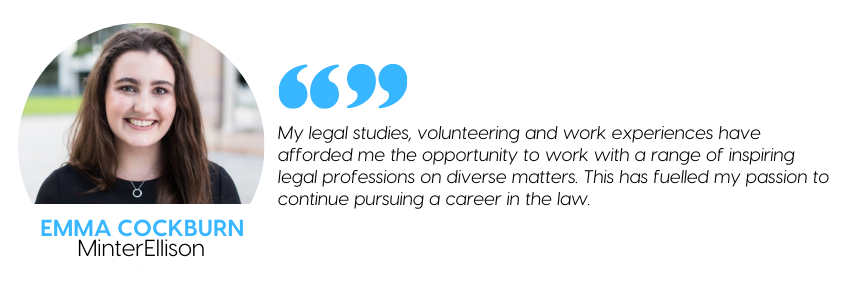
What does it mean to you to be a finalist in this years’ Women in Law Awards?
A: I am delighted and honoured to be a finalist of this years’ Women in Law Awards law student of the year. It has given me an opportunity to reflect on my achievements and contributions as a law student, and it has driven my ambition to make an impact. It is also a privilege to be recognised among such incredible women, many of whom I inspire to be like.
I am so grateful for the support I have received after being named a finalist. So many of my work colleagues, law school academics and peers, family and friends have reached out and sent me such lovely congratulatory messages. I feel fortunate to have such a strong network around me, and I am thankful for this opportunity.
What are some of the areas of law that you’re most passionate about?
A: The law provides an avenue for advocacy and access to justice. Lawyers must offer creative solutions to help solve difficult problems and deliver the best outcome for their clients. I keep up to date with current affairs, legal and ethical issues. The opportunity to work on matters related to the Royal Commissions into Aged Care Quality and Safety, Violence and Exploitation of People with Disability, and Victoria’s Mental Health System has fuelled my passion to give a voice to and help empower vulnerable communities.
My goal is to ensure that the work that I do is always purpose-driven and promotes equality. After having the opportunity to compete in international business case competitions, I have found a strong passion in the intersection between law, business and technology. I would love to further develop my business acumen and help solve the most challenging commercial issues. I enjoy the fast-paced and ever-changing nature of business, and I would love to be part of that ecosystem.
What are some of your goals for your legal career?
A: Over the years, I have made a conscious effort to seek out diverse experiences in different and challenging environments. I embrace the unknown as I move along the learning curve. My legal studies, volunteering, and work experience have afforded me the opportunity to work with a range of inspiring legal professions on diverse matters. This has fuelled my passion to continue pursuing a career in law.
I would love to gain experience across the public and private sectors. In the future, I aspire to be a leader who employs high-level strategic thinking at the intersection of law and policy. Specifically, I want to empower vulnerable communities and help solve inequities. I want to develop my analytical skills and work with the brightest minds who challenge one another to solve important issues. After having studied and lived in Hong Kong and Taiwan, I would love to continue to work overseas and strengthen my cross-cultural skillset. Another one of my goals is to complete further study at an international institution. Specifically, I would like to explore international public policy. I would like to help solve bilateral and multilateral legal issues, including international trade matters and international human rights.
How important do you think it is that new female lawyers are recognised?
A: I believe it is incredibly important to recognise and empower women. Empowering women is essential to political, social and economic development. Often the knowledge and abilities of women go unrecognised, and it is important that the contribution women make is celebrated. Women must be at the table in decision-making and policy. Equal participation in all aspects of society is not only fair but also an economic priority.
I feel fortunate to be in an environment that has empowered me to achieve my goals, but many women aren’t afforded the same opportunities, and there is work to be done. The Women in Law Awards is an important platform that celebrates women in the legal profession. Gender equality is a human right, helps prevent violence against women and girls and makes our communities safer and healthier.
Have you got any female role models, and do you hope to one day be one?
A: I am passionate about equality, and I am fortunate to have strong female mentors in the legal profession. There are two women that have been instrumental in my development. First, my mum, Associate Professor Tina Cockburn, is the director of the Australian Centre for Health Law Research and a sessional member of the Queensland Civil and Administrative Tribunal.
Second, my partner at MinterEllison, Penelope Eden, is the firm’s national aged care and human services sector lead. These women, among many others, have inspired me with their professionalism and technical expertise. They motivate me to continue working hard and always be the best version of myself.
In the future, I aspire to be a leader who employs high-level strategic thinking at the intersection of law and policy. Specifically, I want to empower vulnerable communities and help solve inequities. I want to develop my analytical skills and work with the brightest minds who challenge one another to solve important issues.
Sarah McKenzie, DLA Piper
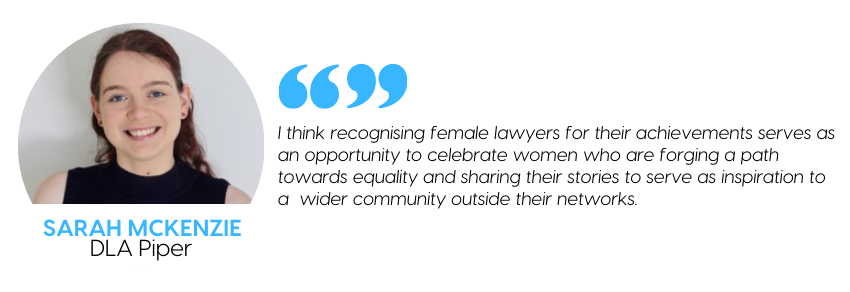
What does it mean to you to be a finalist in this years’ Women in Law Awards?
A: To me, being a finalist means being able to demonstrate to other law students and prospective law students that there is so much more to being a good law student than having good grades. I thought when I started my law degree that the things I would be most proud of when I graduated would be the distinctions and high distinctions on my transcript and my ability to secure a graduate position. Whilst I am proud of my grades and grateful to have a graduate offer with DLA Piper, I’ve come to learn that who you are as a person is so much more important than the title you hold in your career.
I hope to remind young women who are considering pursuing a career in the law that your grades are just one aspect of a larger picture of who you are as a student, a lawyer, and a person. Pursuing activities that you’re passionate about, both within and beyond on the law, are just as, if not more, important than any grades on your academic transcript. Being a finalist is, therefore, both a recognition of my community work and an opportunity to inspire other law students to value themselves outside of the classroom and the workplace.
What are some of the areas of law that you’re most passionate about?
A: Through both my law degree and my arts degree majoring in politics and international relations, I’ve developed a dual interest in both commercial legal work and pro bono work. I am currently employed as a paralegal in the real estates team at DLA Piper, and I am greatly enjoying being exposed to commercial transactions. I have been fortunate enough to be exposed to a variety of work, and feel as though there is are infinite opportunities to learn and expand my knowledge in this area.
Additionally, both throughout my time at university and my clerkship and paralegal roles at DLA Piper, I have been able to engage in significant volunteering and pro bono work. I was granted the opportunity to learn from and collaborate with the Redfern Indigenous community through the Walama Muru program at UNSW. In addition, I have undertaken pro bono work through my role at DLA Piper, which has granted me an insight into modern issues facing Indigenous Australians. Further, this passion for justice has led me to volunteer in the community more broadly. I volunteered as a clerk at my local community legal clinic for three years, which allowed me to be part of bringing access to justice to my community. This was of particular importance to me as many clients were from diverse backgrounds, including those with mental illnesses. I have found being a part of aiding them in accessing the justice system exceptionally rewarding.
I am exceptionally grateful to currently be working in a role where I can balance both my interest in commercial law and my passion for social justice.
What are some of your goals for your legal career?
A: I find it exciting to be at the end of my time as a student, and considering my future as a lawyer, and my subsequent goals for my legal career. In the short term, I am working towards being admitted as a solicitor in NSW and look forward to starting the graduate program with DLA Piper in 2022. I am currently greatly enjoying my time in the real estate team and hope to further develop my skills and continue my learning within the practice group.
As part of my development, I am excited to increase my involvement in pro bono work as I transition from my university volunteering programs to working at DLA Piper full-time. Although I have not been at the firm very long, I have found the pro bono work I have undertaken so far exceptionally rewarding, particularly through the firm’s engagement with the Indigenous community. It is my goal to continue my commitment to pro bono work throughout my career, irrespective of the area of practice I settle in.
In the long term, I also have dreams of practising overseas. In January 2020, I was fortunate enough to undertake an exchange and study law at Trinity College in Dublin. Studying overseas granted me an incredible opportunity to grow and challenged me in ways I could have never anticipated. I hope one day to be able to challenge myself again and continue my learning by moving to practise overseas.
How important do you think it is that new female lawyers are recognised?
A: I think it’s very important that new female lawyers are recognised for their achievements. Recognising female lawyers for their achievements serves to reinforce to the individual award winner, as well as the wider community, that women are capable of being excellent lawyers. Although the profession has progressed significantly, there are still structural, policy and other barriers which disproportionately impact women in entering and practising in the legal profession.
I think recognising female lawyers for their achievements serves as an opportunity to celebrate women who are forging a path towards equality in the legal profession and sharing their stories to serve as inspiration to a much wider community outside their own personal and professional network. I am incredibly fortunate to work in an all-female practice group, to have been in a clerk cohort where seven out of nine clerks were women, and to have countless examples of successful female lawyers in my firm. However, I understand that my position is a privilege built on the hard work of other women before me, paving the path for women in the legal profession. I think it’s so important that women are celebrated for the work that they do to make the legal profession more accessible for the next generation of lawyers and law students such as myself.
Have you got any female role models, and do you hope to one day be one?
A: I am grateful to work in a team that comprised an abundance of female role models. In the real estate team currently, I work in an all-female team in the Sydney office, including two female partners, two female senior associates, two female lawyers, and a female graduate. Working in this team has subconsciously built my confidence, as the incredible women I am surrounded by demonstrate that women are well and truly capable of being market leaders.
Of particular inspiration to me are the partner and senior associate who I work most closely with, Kate Pickthall and Carolyn Harding-Smith. Kate and Carolyn are two of the most hardworking and competent lawyers I’ve ever worked with, and they are also two of the kindest and most compassionate people I’ve ever met. I consider Kate to be somewhat of a superhero as she balances being a partner in an incredibly busy practice group with being a mum. Despite how much she is personally juggling, Kate always finds time to check in with me and ensure I am being supported, both personally and professionally. Carolyn also works incredibly hard and oftentimes doesn’t seem to have enough hours in the day to achieve everything she’d like to. Despite this, Carolyn has always found and taken the time to answer any questions I may have and explain every task she’s asking me to do. Their support has allowed me to develop the confidence that I can excel in a commercial law environment.
I hope one day I am able to become as supportive and kind a role model as Kate, Carolyn, and the whole real estate team have been to me.
Deslyn Sinha, Employsure Law
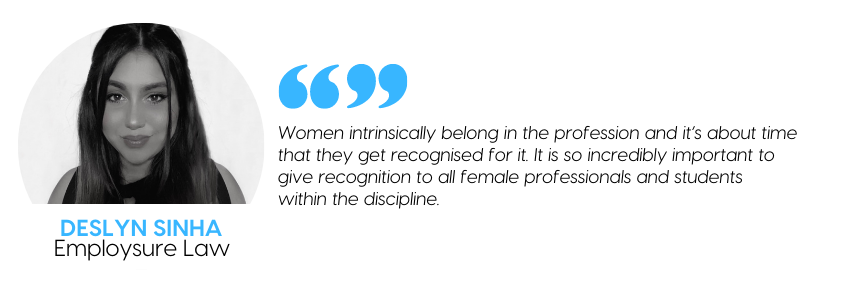
What does it mean to you to be a finalist in this years’ Women in Law Awards?
A: To be recognised as a finalist for my work ethic and contributions to the legal industry is such an incredible surprise and honour. I am elated to be named among a group of elite and inspiring women who dedicate themselves to the profession and strive to positively influence it as it continues to evolve.
As a woman of colour, this recognition is especially felicitous and humbling as it serves as a reminder that the work I do, both academically and professionally, truly matters. However, I would not be where I am today if not for my incredible colleagues, family, and friends, so this achievement is equally extended to them. This experience compels me to continue to stay the course and encourage other young women, especially those of colour, entering the legal sphere.
What are some of the areas of law that you’re most passionate about?
A: Human Rights Law and Employment Relations/Labour Law are two areas that I am most passionate about. They are both powerful sub-fields but do not exist without limitations. It is within these limitations that my fascination and passion as to how the law is applied and interpreted came about. My personal experiences intertwined with my studies and experiences within the legal industry thus far have fuelled my desire to contribute to a greater cause and tackle legal affairs at varying levels within these scopes.
What are some of your goals for your legal career?
A: As the field of law is very give and take, I know I will be able to better my practice by learning from the people I serve. In that sense, my goal firstly would be to get admitted to the Supreme Court of NSW. I would like to then progress into the role of a legal officer or legal associate of the United Nations. It would perfectly tie together my knowledge and passion for Human Rights, global governance, and Labour Law. As all three scopes are universal, there is much to be done on an international level that expands beyond the ambits of Australian law alone. At that point, I would like to continue to dedicate my career to make significant contributions in reducing several deficiencies and affecting long-lasting change, by way of potential reform, within these disciplines.
How important do you think it is that new female lawyers are recognised?
A: Women intrinsically belong in the profession, and it’s about time that they get recognised for it. It is so incredibly important to give recognition to all female professionals and students within the discipline. There are so many fascinating, well-rounded individuals that it is so easy to get lost in the competitive and sometimes overwhelming nature of it all. We almost become programmed to believe that the work we do, day-in-day-out is unnoticed.
The Women in Law Awards is a terrific initiative that gives the working and academic women the time, space, and platform to not only share but to be supported for their capabilities and work done across the industry and field. Recognition of females is a pivotal step in the right direction that tackles the confidence crisis of many women, especially those starting out, and challenges the conventional and masculine ideals of success.
Have you got any female role models, and do you hope to one day be one?
A: Women, for far too long, have been given a mould for the roles we play in life, the jobs we can or can’t secure, what our success looks like. Each day that I grow, as an individual or a professional, I find myself drawing from and being inspired by all the wonderful females around me – from my mother, closest friends, and my peers.
It would not be a true testament to only put forward one of two names. All the women in my life come from diverse backgrounds, some I am connected to by culture and identity, others by career, and what they all have in common is the fact that they all show up and put in the hard work, even when it feels all too easy to give up. As a firm believer in diversity, equality, and inclusivity – I will work towards creating a space within the profession so that other women can become inspired by my work and myself in the way these women have inspired me.
Alli Taylor, Coulter Roache
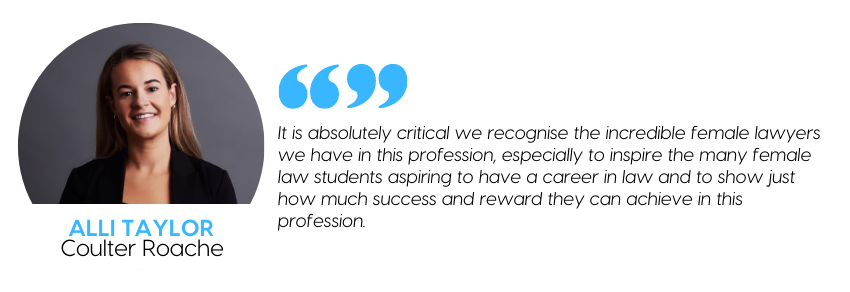
What does it mean to you to be a finalist in this years’ Women in Law Awards?
It is such an honour to be a Law Student of the Year finalist in this years’ Women in Law Awards. To be recognised as a finalist amongst so many amazing female law students is something I will never forget. To me, I feel as though all my hard work is being recognised at a level I could have only dreamed of.
I also believe it is significant in showing law students how seeking a position in the industry whilst studying, as well as getting yourself out into the community in general, has endless benefits.
What are some of the areas of law that you’re most passionate about?
Whilst I have worked in other areas of law, I am definitely most passionate about the area of family law for a number of reasons.
I find that family law is an area where you can really feel as though you are helping people. It is an area where clients are at their most vulnerable and going through one of the most difficult times in their life and you are able to guide them with your knowledge of the law out the other side with support and in a way where they feel confident and happy to move on with their lives.
I also feel as though you have the ability to somewhat make a difference to that person’s life as you are helping each client through an extremely difficult time.
Family law offers many challenges by each file being different to the next and this is also something I definitely love about family law.
What are some of your goals for your legal career?
As I have completed the final year of my law degree this year, for the short term, I am now moving into my law graduate position at Coulter Roache where I will study my Practical Legal Training through the College of Law alongside and work towards being admitted to the Supreme Court of Victoria.
I would love to then progress into practicing in the area of family law as a junior lawyer and continue to learn and work alongside the phenomenal family law team we have at Coulter Roache and broaden my knowledge and expertise in family law matters and the complexities of same. As I have found myself to be very passionate and intrigued by this area, I would love to see my legal career evolve in this area of law.
How important do you think it is that new female lawyers are recognised?
I believe recognition of female lawyers is extremely important. It is absolutely critical that we recognise the incredible female lawyers we have in this profession, especially to inspire the many female law students aspiring to have a career in law and to show just how much success and reward they can achieve in this profession.
The Women in Law Awards event is exemplary for doing so and such a great way to acknowledge and appreciate the amazing females we have in the legal profession. It also allows others to see the incredible female lawyers they can learn from and work alongside.
Have you got any female role models, and do you hope to one day be one?
I was so incredibly lucky to grow up with such an amazing female role model, who will forever be my role model in life, my mum. She has always inspired me with her hard work and dedication and moulded me into the person I am today.
I have met so many incredible female role models since starting my career in the legal profession in Year 11 and who have all taught me so much.
I worked closely with a female legal executive when I got my first job at a law firm and she mentored me in so many ways with her copious years of experience.
Since working at Coulter Roache, I have been surrounded by a number of strong female role models. Our Family Law Team consists of many females who all inspire me. I worked closely with Bridgette Kelly, Special Counsel at Coulter Roache, when first starting in Family Law and she will forever be a role model to me. Bridgette is an extremely efficient and proactive lawyer and I looked up to her when becoming her assistant in the second year of my law degree.
Our Family Law team is led by two powerhouse women, Anne O’Loughlin, the Managing Principal, and Bonnie Phillips, the Head of Department. Bonnie and Anne are such amazing female role models. They are both such hard working and driven women who mentor our Family Law team in so many ways. They both hold a strong and genuine care for our Family Law team alongside their continual success as lawyers. They are two women I will also forever see as my female role models.
I definitely aspire to follow in these women’s footsteps and one day be a female role model as inspiring as them.
Haiqiu Zhu, NSW Court of Appeal
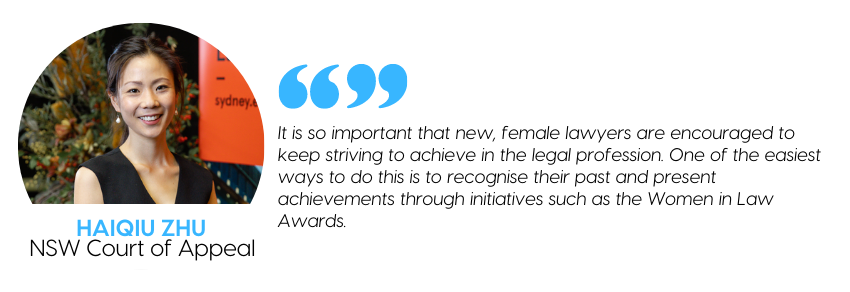
What does it mean to you to be a finalist in this years’ Women in Law Awards?
A: It is a privilege to be named a finalist in this year’s Women in Law Awards. I am fortunate to have been mentored by some incredible women lawyers, and so I am humbled to be recognised for my own contributions as a woman and law student. Being named as a finalist has given me the encouragement to keep striving to work hard and to do what I can to help other women lawyers around me.
What are some of the areas of law that you’re most passionate about?
A: As a law student, I enjoyed studying the various private law subjects – contracts, equity, corporations law – and my interest in commercial law has only deepened through my experience working at HSF and now at the Court of Appeal. Private law has always interested me as it is the rules that govern the way we interact with each other day to day. The legal principles have both shaped the way that society functions and been shaped in turn by our social needs.
For example, the equitable jurisdiction grew out of the need to alleviate perceived injustices resulting from the application of the “strict” rules of the common law. Yet over time, through repeated equitable intervention, so too did that jurisdiction develop into an ossified body of law. Now, as our society continues to innovate and grow, it’s fascinating to see how legal principles are made to fit novel scenarios and solve unprecedented problems. It’s exciting to be a part of that.
What are some of your goals for your legal career?
A: While I may have just been getting started a legal career, having recently finished my undergraduate degree, I suppose I do have rather grand plans for how I hope my career will progress! I am currently working as a tipstaff to a judge of the Court of Appeal and am keen to make the most of my time there in such close proximity with some of the sharpest legal minds in NSW. From there, I plan on undertaking postgraduate study overseas before returning to commercial practice.
Ultimately my goal is to establish a practice at the bar. Throughout university, I was keenly involved in mooting and have a passion for advocacy, which I am keen to pursue. Or, as my family and friends might put it, given my argumentative nature and need to always be in the right, why not make a career out of it? In any case, I aspire to the bar as I see it both as an opportunity to represent and speak on behalf of those who may be less advantaged than me and also to satisfy my own intellectual curiosity and love of the law.
Importantly though, throughout all of this, I hope to help other women lawyers achieve their goals and to foster their passion for the law. Having had the benefit of working with and learning from a number of talented and generous women, I hope to leave the same impact on others.
How important do you think it is that new female lawyers are recognised?
A: I think it is incredibly important that female lawyers are recognised for their achievements. It goes without saying that the legal profession has historically been heavily male-dominated. Even today, while there is better gender equality (at least in terms of numbers) among law students and junior lawyers, there are glaring disparities between the number of men and women in positions of power and leadership within the profession. This has flow-on effects – younger women may be discouraged from pursuing their goals for want of any role model to look up to or any mentor to foster their development.
For this reason, it is so important that new female lawyers are encouraged to keep striving to achieve in the legal profession. One of the easiest ways to do this is to recognise their past and present achievements through initiatives such as the Women in Law Awards. Even the slightest acknowledgment of what women lawyers have achieved and are continuing to achieve provides the impetus for us all to individually keep setting and achieving our goals on a personal level and to collectively strive for equality in the legal profession.
Have you got any female role models, and do you hope to one day be one?
A: I have been so lucky to have several wonderful female role models, both inside and outside the law. The women in my family – my mum and my grandmother – have shown me what can be achieved through hard work and determination. They also taught me to stay intellectually curious and to keep asking questions. There are also my various coaches and mentors as a law student and law graduate, who have all fostered my development as a lawyer. Not only did they teach me legal principles and develop my love of the law and advocacy, but by being such high-achieving women lawyers in their own right, they also gave me something to aspire to – the woman and lawyer I hope one day to be.
Having been the beneficiary of the generosity of so many female mentors and role models, of course, I hope one day to also be a role model for other women lawyers. I am indebted to my role models for shaping me into the female lawyer that I am. I could only hope to be able to leave the same impact on others by helping them achieve their goals and aspirations as I have had help in achieving mine.
